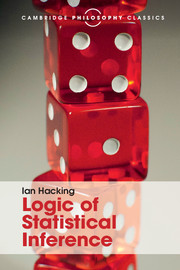Book contents
Preface
Published online by Cambridge University Press: 05 July 2016
Summary
This book analyses, from the point of view of a philosophical logician, the patterns of statistical inference which have become possible in this century. Logic has traditionally been the science of inference, but although a number of distinguished logicians have contributed under the head of probability, few have studied the actual inferences made by statisticians, or considered the problems specific to statistics. Much recent work has seemed unrelated to practical issues, and is sometimes veiled in a symbolism inscrutable to anyone not educated in the art of reading it. The present study is, in contrast, very much tied to current problems in statistics; it has avoided abstract symbolic systems because the subject seems too young and unstable to make them profitable. I have tried to discover the simple principles which underlie modern work in statistics, and to test them both at a philosophical level and in terms of their practical consequences. Technicalities are kept to a minimum.
It will be evident how many of my ideas come from Sir Ronald Fisher. Since much discussion of statistics has been coloured by purely personal loyalties, it may be worth recording that in my ignorance I knew nothing of Fisher before his death and have been persuaded to the truth of some of his more controversial doctrines only by piecing together the thought in his elliptic publications. My next debt is to Sir Harold Jeffreys, whose Theory of Probability remains the finest application of a philosophical understanding to the inferences made in statistics. At a more personal level, it is pleasant to thank the Master and Fellows of Peterhouse, Cambridge, who have provided and guarded the leisure in which to write. I have also been glad of a seminar consisting of Peter Bell, Jonathan Bennett, James Cargile and Timothy Smiley, who, jointly and individually, have helped to correct a great many errors. Finally I am grateful to R. B. Braithwaite for his careful study of the penultimate manuscript, and to David Miller for proof-reading.
Much of chapter 4 has appeared in the Proceedings of the Aristotelian Society for 1963–4, and is reprinted by kind permission of the Committee. The editor of the British Journal for the Philosophy of Science has authorized republication of some parts of my paper ‘On the Foundations of Statistics’, from volume xv.
- Type
- Chapter
- Information
- Logic of Statistical Inference , pp. xi - xiiPublisher: Cambridge University PressPrint publication year: 2016

